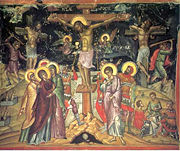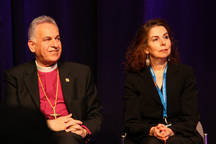A couple of weeks ago, a friend of mine asked on Facebook what we would say if we had to Tweet the Good News of God in Christ Jesus on Easter morning.[1]
You all know what Twitter is, right? It’s that instant messaging service in which you can say whatever you want in 140 characters or less, including spaces and punctuation.
I have to be honest: I have not been a fan of Twitter. I find it to be terribly narcissistic, that most of what goes out to the world is useless, vainglorious nattering.
 But Twitter now has a place in our lives. Look at the role it has played in the Arab Spring … in Tunisia, Egypt, Morocco, Yemen, Bahrain, Lebanon and Syria. More than 26 million Americans alone use Twitter … tens of millions more people use it around the world, and tens and tens of millions more people follow it without every posting a thing.
But Twitter now has a place in our lives. Look at the role it has played in the Arab Spring … in Tunisia, Egypt, Morocco, Yemen, Bahrain, Lebanon and Syria. More than 26 million Americans alone use Twitter … tens of millions more people use it around the world, and tens and tens of millions more people follow it without every posting a thing.
Which means that if we can come up with a really, really, really great Tweet on Easter, we could reach tens of millions. And if our Tweet is really, really, really, really great, we can reach maybe even hundreds of millions of people!
All we have to do is figure out what to say about the Risen Lord in 140 characters or less … including spaces and punctuation.
So here’s our challenge on this Easter morning:
What should we say?
How should we announce the greatness of this day?
Should we edit Peter down and say, “Jesus Christ is Lord of all, raised from the dead on day three. He is ordained by God as judge of all. All who believe receive forgiveness”? (That’s 138 characters, by the way.)
Meh … too complex.
Perhaps we could turn to the Psalmist: “The right hand of the Lord has triumphed! The right hand of the Lord is exalted! This is the Lord’s doing, and it is marvelous in our eyes.”? (That’s 139 characters.) But … that’s not quite clear, is it? And it is very triumphalist. So this won’t work either.
Now we could quote Paul, the apostle who never met Jesus in the flesh, only the Risen Lord on the road to Damascus. His Tweet could read: “You have been raised with Christ. Set your minds on things above where Christ is. For you have died, your life is hidden with Christ in God.” (Ha! That one is exactly 140 characters!)
Um … I’m thinking this isn’t the good news we were looking for.
So what about quoting the Risen Lord himself? “Jesus says: Do not be afraid; go and tell my brothers to go to Galilee; there they will see me.” (Ninety-five characters – pretty concise.) Unfortunately, it doesn’t tell people that Christ is risen, does it?
There’s the message from the angel: “Do not be afraid. He is not here. He has been raised.” That’s fairly straight-forward, and it only takes 53 characters.
It is Good News, but is it enough? Does it really convey what we want it to convey? Is it enough to convince people that this is the Good News of their lives? I don’t think so.
So even though we know what the Gospel, the Good News of God in Christ Jesus, is and what it means, we still don’t have a message to Tweet that is good news for our readers.
And we do want to convey good news, because this is our job. We don’t just get the Good News this morning … we have to give it as well. That’s what Jesus meant when he said, on the day he died for us, “It is finished.” He was saying that his work on this earth was done, and now he was turning it over to us.
Make no mistake: This is our job. We have to spread the Good News to a world that does not know the Good News is even there! There’s a whole world out there that hasn’t quite gotten the message. For far too many people, this day isn’t about resurrection. It’s about Easter eggs and chocolate bunnies!
But Jesus gave us this job, and we’d better get working.
So tell you what.
Let’s roll up our sleeves, and let’s build a Tweet together.
Let’s figure out how to share with the whole world the Good News we receive on this holiest day of our lives.
We can start with the words of the ancient song, the Exsultet, which can only be sung on Easter.
(chant)
Rejoice now, heavenly hosts and choirs of angels,
And let your trumpets shout salvation
For the victory of our mighty king.
Rejoice and sing now, all the round earth,
Bright with a glorious splendor,
For darkness has been vanquish’d by our eternal King.
Rejoice and be glad now, Mother Church,
And let your holy courts, in radiant light,
Resound with the praises of your people.
That’s a pretty good message, don’t you think?
A little long, though … it kind of blows the 140-character limit.
So let’s reduce it down.
Let’s just make the first part of our Tweet say, “Rejoice!” That’s eight characters – still plenty of room to work with.
But to be effective, we have to be clear why we’re rejoicing.
What is it that makes us so happy on this holy day?
Is it the knowledge that Jesus died for us? For each of us? Personally?
Yes. But what does that mean?
That God loves us, perhaps?
That is why Jesus died for us, you know – because he loved us.
So I think that might be the next part of the message.
“God loves you.”
That’s another 14 characters, so we’re still in good shape.
But even though that message has been repeated many times before, there are still some people who don’t quite believe that God loves them. Some people don’t believe Jesus died for them, and others say, “Yeah, OK, he died for us, but how does that prove that God loves us?”
Well, we have that answer, don’t we? It’s pretty simple, actually:
Jesus’ tomb is empty.
(chant)
This is the night,
When Christ broke the bonds of death and hell,
And rose victorious from the grave.
The women went to the tomb on the third day so they could anoint Jesus’ body, but he wasn’t there. He was gone. It was the angel who told them the God’s-honest truth: He has been raised from the dead – just like he told you.
In that rising, my friends, God proves his love for us by not just defeating but by annihilating the one thing we fear the most: death itself.
Jesus loved us so much he died for us – for each one of us, right here.
God loves us so much he destroys death for us – for each one of us, right here.
So let’s make that the next part of our Tweet:
“The tomb is empty! Jesus Christ, who died for us, is risen!”
That takes us up to 83 characters. Meaning, we still have some room to get more of our message across.
So let’s explain some more why this is all Good News.
(chant)
This is the night,
When all who believe in Christ
Are delivered from the gloom of sin,
And are restored to grace and holiness of life.
How blessed is this night,
When earth and heaven are joined,
And man is reconciled to God.
And there you have it.
The gloom of sin, which leads to death – emotionally, spiritually and physically – has been lifted. Our lives, which sometimes can seem so empty, so pointless, so difficult, so draining, are restored to grace and we are made holy again.
Any separation from God that we may have experienced in our lives is over and done with. We have been reconciled to God. Our relationship has been put to right, we have been brought together, our accounts have been squared. We are reunited with God, and all our differences have been patched up and resolved.
By dying for us, Jesus wiped the slate clean.
By raising Jesus from the dead, God keeps that slate clean … forever.
And that is Good News indeed. Why, it’s such Good News that I think we ought to praise the Lord for it.
So let’s put an “Alleluia!” in our Tweet. We’ve got the room.
And look! We still have some room left.
So let’s go back to where we started. Let’s put in another “Rejoice!”
Put it all together, and I think we just might have our Tweet. I think we are ready to proclaim to all the world what makes us so very happy on this Easter morning.
“Rejoice! God loves you! The tomb is empty! Jesus Christ, who died for us, is risen! All of us are reconciled to God! Alleluia! Rejoice!”
And we did it in 135 characters, thank you very much! I think my friend on Facebook would be pleased.
Yeah.
We have Good News to share this morning:
God loves us, and we can prove it. The tomb is empty, Christ is Risen. Alleluia!
And you can Tweet that!
Amen.
Easter sermon, preached at Trinity Episcopal Church, Arlington, Va., 24 April 2011, Year A.
[1] The Rev. Mark Delcuze, Rector, St. John’s Episcopal Church, Beverly Farms, Mass., “Tweeting the Resurrection,” 13 April 2011, https://www.facebook.com/mark.delcuze?sk=notes


























